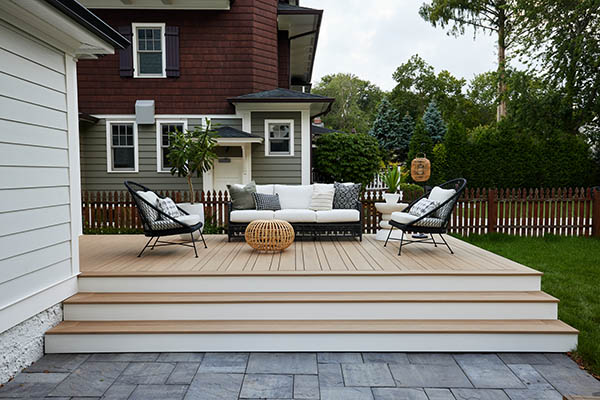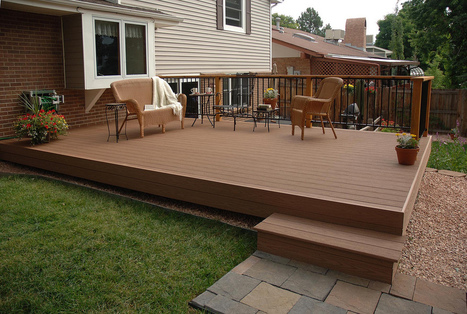If you're searching for top-rated deck installation near me, be sure to compare reviews and services.
If you're searching for top-rated deck installation near me, be sure to compare reviews and services.
Blog Article
How to Select the Right Materials for Your Deck Setup Job
Picking the appropriate materials for your deck setup task can seem daunting. There are many elements to think about, from durability and maintenance to aesthetics and ecological influence. The option in between conventional timber and composite products, each with its own collection of advantages and drawbacks, can be especially challenging. The trick is to balance your budget plan, design preferences, and way of life requires to produce a deck that will improve your outdoor space for several years to find.
Comprehending the Various Kinds of Deck Products
When getting started on a deck installment project, the choice of products becomes a pivotal decision. Different options are offered, each with unique features and aesthetic appeal. Typical wood, for circumstances, offers a classic, all-natural appearance and is normally much more affordable. It can warp over time and requires routine maintenance. Composite products, on the other hand, are a blend of timber and plastic, providing resilience and resistance to weather elements. They require much less upkeep contrasted to wood however are normally a lot more pricey. An additional choice is plastic, which is essentially maintenance-free and immune to parasites and rot, albeit much less natural-looking. By understanding these distinctions, house owners can make an extra educated choice on one of the most appropriate deck product for their specific demands.
Evaluating the Resilience and Maintenance Demands of Deck Materials
Examining the longevity and upkeep needs of deck materials is an essential action in deck setup. Resilience involves the product's capability to stand up to extreme climate condition, wear and tear, and its durability. Cedar and redwood are naturally immune to rot and bugs, making them sturdy options. On the other hand, pressure-treated wood, while resilient, may call for even more upkeep as a result of its sensitivity to fracturing and warping.
Comprehending maintenance needs is just as essential. Some products need routine securing or tarnishing to keep their look and withstand wetness damages, while others, like composite outdoor decking, require less upkeep. By evaluating these aspects, one can select one of the most appropriate outdoor decking product, ensuring an equilibrium in between longevity, upkeep needs, and aesthetic charm.
Price Analysis: Contrasting Timber and Compound Decking
Although expense may at first appear like a secondary issue, it is a considerable element when contrasting timber and composite decking. On the other hand, composite decking, while pricier at first, needs much less maintenance, potentially lowering long-lasting expenses. Possible deck owners must consider their budget and readiness to preserve their decks when deciding in between timber and composite decking.
Visual Appeals and Style Versatility of Decking Materials
While expense is a crucial consideration, the visual charm and layout flexibility of decking products also play a substantial function in the decision-making procedure. Different materials supply differing levels of visual appeal. All-natural timber decking supplies a classic, classic look, while composite materials provide a broad range of shades and textures to match diverse preferences and styles. Likewise, style flexibility describes the capacity to form and manipulate the outdoor decking material to meet specific layout needs. Wood, as an example, provides high style versatility due to its ease of reducing and forming. Compound materials, while much less flexible in layout, are still versatile enough for many deck designs. These elements, consequently, are important components in the selection of outdoor decking material.
Ecological Influence of Decking Materials
When picking outdoor decking materials, one need to consider not just appearances and longevity, however additionally the environmental impact. It is very important to analyze the sustainability of materials and check out recycled decking choices. In addition, recognizing the possible effect on local environments will guarantee a much more ecologically liable selection.
Evaluating Material Sustainability
In the realm of deck building and construction, evaluating material sustainability is an important step. This entails assessing the ecological influence of each prospective material, taking into consideration elements such as the power required for its manufacturing, its carbon impact, and its end-of-life disposal or reusing alternatives. For example, timber is a renewable energy, yet unsustainable logging practices can result in logging. Additionally, composite outdoor decking products typically incorporate timber and plastic, decreasing the demand for new wood yet boosting dependence on nonrenewable fuel sources. Aluminum and various other metals may be much more sturdy and recyclable, but their extraction and processing can be energy-intensive. Hence, the selection of outdoor decking materials should stabilize performance, looks, expense, and sustainability to make sure a liable and durable installation.
Recycled Outdoor Decking Choices

Composite decking is specifically popular due to its toughness and simplicity of maintenance. Recycled plastic important site outdoor decking, on the other hand, is YOURURL.com very resistant and needs very little upkeep.

Effect On Local Communities
While the benefits of making use of recycled products for outdoor decking can not be overstated, it's equally essential to take into consideration the more comprehensive ecological implications of these options. The removal, processing, and transport of products can exceptionally influence regional ecological communities. Logging for lumber outdoor decking adds to habitat loss and environment change. Even the production of composite materials can release harmful discharges. Conversely, making use of recycled or sustainably sourced products can help reduce these effects. Considering the lifespan of products can lower environmental impact; longer-lasting options require much less constant replacement, hence preserving sources. Correct disposal of old outdoor decking is crucial to lessening landfill waste. Essentially, an eco-conscious deck project needs cautious material choice, lasting sourcing, and accountable disposal.
Making Your Last Decision: Tips for Choosing the most effective Deck Products
As the write-up changes right into the subtopic of "Making Your Decision: Tips for Picking the most effective Deck Materials", it is vital to recognize the variety of deck products offered. Striking an equilibrium between resilience and aesthetics is essential in this choice procedure. The following discussion will assist visitors in making an educated choice based on these vital factors to consider.
Comprehending Different Deck Materials
The job of picking the appropriate products for your deck installation can appear daunting due to the vast variety of options readily available. Plastic or PVC decks are also extra long lasting and call for much less maintenance than composite products, however they can look less natural. Aluminum decks are strong, lightweight, and immune to rot, but they are likewise the most pricey option.
Resilience vs. Aesthetic Appeals Balance
Balancing longevity with visual appeals can be a challenge when selecting deck materials. The choice frequently boils down to personal choices and the deck's planned use. High-traffic locations may require sturdy products like composite decking, which endures deterioration yet might lack the all-natural elegance of wood. On the other hand, wood supplies a classic charm and warmth that artificial materials battle to replicate. However, it needs much more maintenance and may not last as long. House owners require to strike an equilibrium, thinking about both the deck's useful demands and their visual preferences. By doing so, they can ensure their deck remains a practical and attractive outdoor area for my sources several years ahead.
Verdict
In conclusion, selecting the right materials for your deck installation task needs careful factor to consider of variables such as durability, maintenance, expense, looks, and environmental impact. Whether you go with conventional wood or composite products, your choice should straighten with your budget, layout preferences, and way of living. Ultimately, the best decking material is one that boosts your outdoor space and supplies pleasure for many years to come.
Report this page